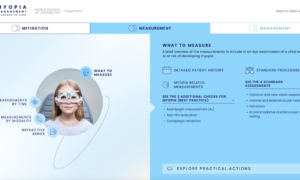February 1, 2024
 NEWARK, N.J. – Jobson Optical Research and Review of Myopia Management have released the Myopia Management 2024 Survey results, which gauge the attitudes and behaviors of eye care professionals in the United States regarding myopia management.
NEWARK, N.J. – Jobson Optical Research and Review of Myopia Management have released the Myopia Management 2024 Survey results, which gauge the attitudes and behaviors of eye care professionals in the United States regarding myopia management.
Jobson Optical Research and Review of Myopia Management polled nearly 500 ECPs throughout the country during the fourth quarter of 2023, and the results are now available in this newly released survey. Survey respondents answered questions that included:
- How many years have you been in practice?
- What percentage of your patients aged 18 and under would you estimate are myopic?
- Does your practice provide myopia management eye care treatment therapy for myopia progression control to slow the progression of myopia for patients age 18 and under? If no, why not?
- How proactive are you managing children with progressive myopia?
- How do you prefer to educate yourself on myopia management?
- Which treatment interventions do you currently prescribe to manage myopia in children and adolescents?
- Do you currently measure axial length?
The goal of the survey was to identify trends consistent throughout the eye care industry, especially as the myopia management field continues to expand. By accessing these survey results, ECPs can learn from their colleagues and work to improve their myopia management offerings for their patients.
The results show a significant untapped potential market for myopia management and a great opportunity to educate ECPs due to a large proportion of myopic children who are not receiving myopia management treatments. This should serve as a call to action for educators, eye care professionals, manufacturers, and parents to work together to manage progressive myopia in children and adolescents.
“The survey results highlight the need to educate eye care practitioners on myopia management further. Educators and manufacturers should focus on clinical/scientific as well as practice management training to enable optometrists and ophthalmologists to proactively prescribe evidence-based interventions to manage progressive myopia in children and adolescents,” said Dwight Akerman, OD, MBA, chief medical editor of Review of Myopia Management.
Only 63.6% of respondents said that they provide treatment therapy for myopia progression control despite the fact that 50% of their patients aged 18 and younger are myopic. The top two reasons for not providing myopia therapy to patients aged 18 and under are “Not enough patient demand (61.1%)” and “too time-consuming (31.7%). Additionally, only 20% of respondents who stated that they are providing therapy for myopia progression control in their practice said that they are “very knowledgeable” about managing progressive myopia in patients aged 18 and under.
The survey is available at no cost to all eye care professionals here.













